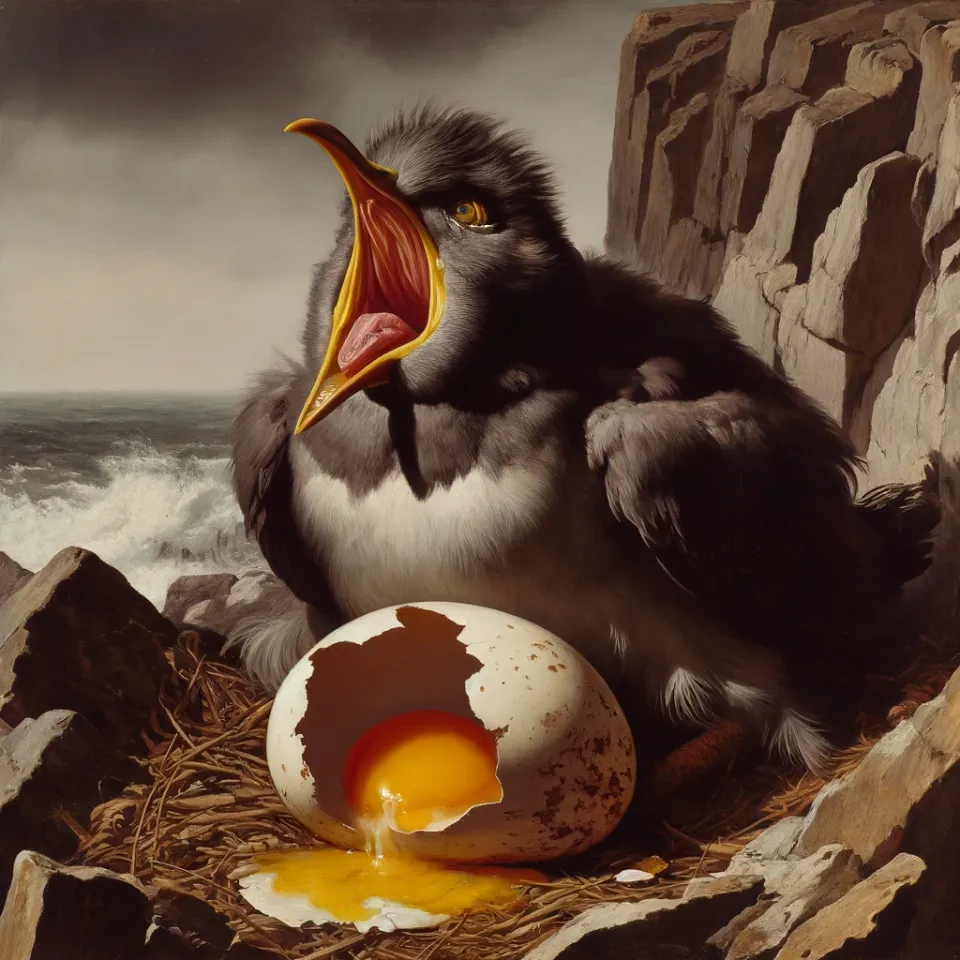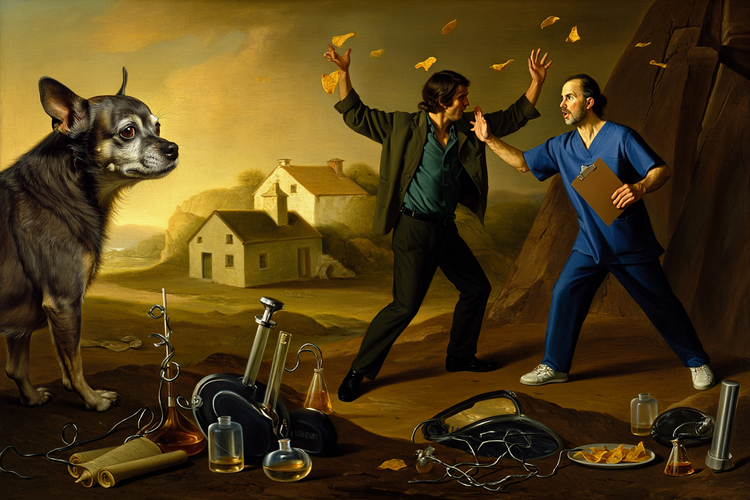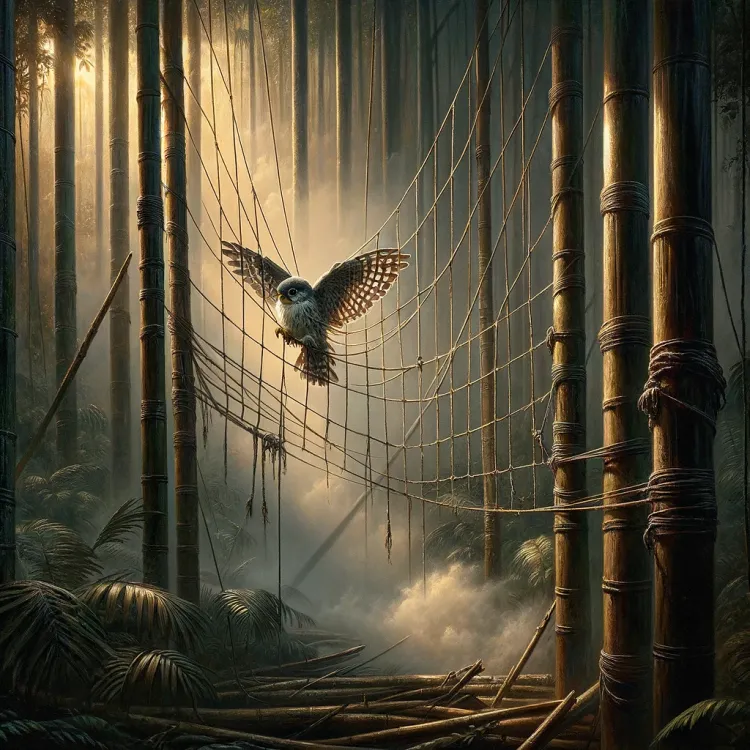The Auklet

Off the coast of San Francisco there's a small, rocky island with a very old lighthouse. Years ago, I spent some time there as a field intern. It's only accessible via a ride on both inflatable skiff (through shark-infested waters), then a vertical lift on a hydraulic crane onto a vertical crag. There are no roads, no grocery stores, and no emergency services. If you find yourself in a medical crisis, hopefully conditions aren't too dicey for the Coast Guard to send a chopper.
It's more like being in the ocean than on land. In the spring, the weather is either clammy, curtain-dense fog or howling wind that sweep the skies blue. Gusts of 40mph are normal. The thin topsoil bloom green with hardy weeds, and hundreds of thousands of seabirds congregate to try their reproductive luck, away from land-based predators. They've been coming for millenia, but in the middle of the Civil War San Francisco was so egg-hungry that collectors nearly collapsed entire populations of seabirds (and led to a mini-war on the island that killed two men).
Most of the birds pair up, alternating shifts between seeking the ocean's bounty or guarding their brood from marauders. Ravens and jealous neighbors won't hesitate to plunder a nest. And although tolerated from a distance, hopeful parents of any species won't hesitate to viciously attack one of the 3-5 visiting biologists who venture out from their 150 year old two story sheltered behind a gnarled cypress.
I loved it. It's a place of timeless beauty, terrifying and savage and biologically magnificent. I loved being out of cell phone range. I loved that I needed my pocketknife and water bottle and not my wallet and car keys. I spied on brooding murres from behind a blind or through a spotting scope. From 358 feet up on Lighthouse hill I watched gray whales feeding a stone's throw from the shore. Some nights were spent banding little ashen-winged petrels as they returned from their moonless ocean forays, the lighthouse beaming into the haunting blue fog like a tower of Mordor.
One clear windy day, I was out with my fellow biologists catching rhinoceros auklets, a pigeon-sized bird with the athleticism of a particularly gifted penguin. Although they can fly, their true gift is in the water. Venturing from their shallow burrows at night, they flap and glide through the dark water, tracking the dull flashes of their bioluminescent prey. During breeding season, a keratinized spike grows on the end of their bill to give them their namesake. Each monogamous pair lays a single egg each season, trading the warmth of their bellies for the cold depths of squid-finding in alternating shifts.
Catching auklets is pretty easy. You just grab it (the horn is just for show, they're harmless). Just make sure you pin the wings against its sides to prevent powerful flapping, and it's game over. Most of the time, they sit fairly placidly while you take your measurements: weight, wingspan, bill length, etc. If it's already banded, record the number. If not, clasp a steel ring around its left ankle with the special banding irons. Document it all in your notepad.
It really is that simple, which is not to say that everyone gets it on their first try. But so often with things like this, the mantra is this, "See one, do one, teach one." So after one chance to observe and one to struggle through, you're expected to have mastery over any particular skill. But no matter how brilliant the demonstration is, there are subtleties to any give technique. You just have to dive in. After witnessing my first auklet-wrangling, I can say that I felt both insecure in my ability and ready to give it a go. You don't end up on an isolated and shrouded crag, immersed in a soundscape of squawking birds and gurgling elephant seals, if you're not willing to jump into the fray.
Given command to invade the next burrow, I dug my hands in aggressively. With chilled fingers, I felt for the scrambling bird and gently gathered the wings against the writhing body. Exhaling as I pulled the nervous animal from the dirt, and with a pigeon-sized shot of adrenaline causing a slight shake in my hands, I turned to look at my peers. But there weren't any smiles. No commendations, nothing I could use for self affirmation. No one was even looking at me. One of them let out a slightly tragic "Oh...". She was looking at a crushed egg, bright yellow yolk swirling into the dirt of the collapsed burrow.
I looked at that egg intensely. Before anything else, I wondered if it was too late to repair. Could we wipe away the dirt and glue it back together? I had the good sense to not ask such as stupid question, but suppressing it led to the slightly nauseating conclusion that I had just destroyed one of the lives I was here to support.
Had I been overzealous? Was I rushing, trying to impress someone? What if I had studied the demonstration more intensely? What if I had tried harder to deflect my attention away from the rocky spires and sun glinting off the wind blasted crests of the Pacific Ocean? Were my hands just clumsy paws that would crush the life from whoever they touched? Maybe it was just fate? Karmic punishment for some (Previous? Unconscious?) sin?
My hand wiggled to life. The auklet was kicking. I cradled the bird, belly up. A more experienced biologist tried to reassure me. These things happen. In any scenario, we still needed to measure the adult. The pair might be able to lay another egg, there was still time in the season. The sacrifice would not be in vain, and several lines of data were scribbled into the yellow notepad. The auklet squawked and flapped as I returned it to the desecrated den. But it kept its gaze on me, staring into my eyes with its head low and beak open. An unmistakable defensive posture. Submissively, I crawled backwards and away.
At some point, it must have realized I was gone. When did it realize the collateral damage from this otherwise anticlimactic "attack"? How do I know what emotions bird feel? Do auklets despair? Did the little bird let out pained squawks for hours until its seafaring partner arrived home to discover the tragedy? I could see blame in its defiant eyes. You're having fun when you're supposed to be doing serious work! You should be focusing! You're getting distracted by that sharky cove that breaks a perfect left handed wave! You're not skilled enough! You're not right for this!
I brooded over the accident for a while. But eventually I beat my guilt into submission. I gave myself the same bland reassurance I might offer to a colleague. All I could do was be more careful. These things do happen. Jumping into the fray can get messy. Field science isn't perfect. To measure a population, it's always necessary to interfere to at least some small degree. You can't be completely hands off. I know all this without any doubt, but still can't shake the guilt.
I'm not sure, logically, if an auklet would try to take revenge. Do they have a sense of anger? I don't know. What does losing an egg mean for their mental health? How much anxiety can a wild animal have about navigating the harsh conditions of a cold, dark ocean to achieve the nutritional requirements for a new offspring? Is there even an opportunity for anxiety? Do they suffer through memories of fruitless dives, near misses with ravenous sea creatures, or plundering biologists? Do they blame themselves for when their slim chances of reproductive success are dashed apart on the unforgiving, rocky soil?
I doubt it. I think wild animals know how unfair life is. I don't think they bemoan unlucky circumstances, or torture themselves replaying missed opportunities in their heads. I think only humans are capable of such grotesque self-reflection. I'd be willing to bet that auklet moved on fairly quickly. The crushed egg stuck with me, because I'd a whole life of mistakes and ambition. But the auklet knew it was still alive. Circumstances willing, it would try again. Life is unfair, but also precious. And there's very little time to waste.





Comments ()